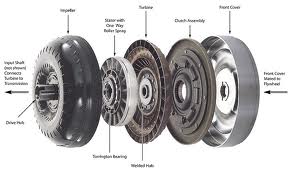Torque Converter Problems
I think every email I get about an automatic transmission problem starts with, “My transmission is having a problem and I think it’s the torque converter.” The truth is, it’s not often the torque converter that’s at fault. I think I hear this because the operation of the torque converter is rarely understood and it seems like a mechanic-ey thing to say. I mean, “torque converter”: It does sound kind of manly. So to combat the ignorance I’ve made this video on how a torque converter operates and what’s inside it.
The torque converter is designed to take the place of a clutch assembly that a manual transmission uses. It also multiplies engine torque so you can take off from a dead stop easier. In addition to that, it also houses what is referred to as the TCC, or torque converter clutch. This is a clutch and works in the same way a manual transmission’s clutch works. It’s there to prevent slippage that normally occurs within the unit. At cruising speeds, the clutch locks up and allows full engine torque to be transferred to the transmission.
A problem with the TCC can cause a few things to happen. The first is poor fuel economy. If you notice a sudden drop in fuel economy, put the TCC on your list of suspects. It’s difficult to check, but as your vehicle is shifting through the gears, count the shifts. If you have a four-speed transmission, count up through the gears as it shifts. After the transmission shifts into fourth, you might feel another shift after that. This is likely your torque converter locking up. When it’s working properly it might feel like another shift at cruising speed. If you don’t feel this shift, there could be a problem with the torque converter or its controls.
Another issue might be that the torque converter clutch does not release and stays applied. If this happens, it’s just like leaving your vehicle in gear with your foot off the clutch when you come to a stop. It’s likely your engine will stall. If you notice that your engine runs fine except when you come to a complete stop, you could have a problem with the TCC staying applied. Consult your service manual for testing procedures.
Video Title: Torque Converter Problems – Solving Transmission Problems – EricTheCarGuy Video Description: In this Article we talk about Torque Converter Problems and how to fix them. Thumbnail: http://www.ericthecarguy.com/images/faq_buttons/Large_FAQ_Images/Transmissions-icon-1200.png
 Our Address
Our Address




3 thoughts on “Torque Converter Problems”
Cristie Jones
May 28, 2023 at 3:36 pm
My issue is within my stator. 2011 Chevy volt. GM apparently sent these off the line with a plastic ring I understand. My car sounds like a “skill saw right off a piece of wet plywood” and now is starting to do what I refer to as ” shuddering”. So my question; is this because my volt’s transmission has 3 clutches ? when I purchase this transaxle stator, can I purchase this in one housing that would house my torque converter (to lessen the headache and keep labor costs down)
Dan
February 8, 2023 at 7:43 pm
I required an oil seal replacement of the ring between the torque converter and the bell housing, but after I got the transmission out, the torque converter was stuck, wouldn’t come out the transmission. Why would that occur?
JEAN LUC M WILL
December 23, 2022 at 6:51 pm
Hi Eric, i am a DIY person and question is : can a torque converter be flush?